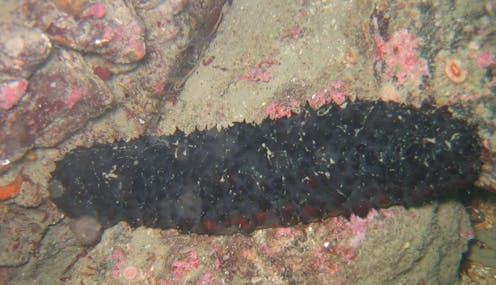Coral reef recovery could get a boost from an unlikely source: Sea cucumbers, the janitors of the se
Sea cucumbers have been overharvested for centuries. At the same time, coral reefs have declined as well. Research suggests that saving the former may help restore the latter.

Sea cucumbers, scavengers of the seafloor that resemble the cylindrical vegetable, have been consumed as a delicacy in Asia for centuries. But in recent decades, they’ve been severely overharvested to a point that they are now quite rare. New research I helped conduct suggests their repopulation could play an important role in protecting and revitalizing another type of endangered marine organism: corals.
Coral reefs are in decline around the world partly due to diseases, some of which are associated with sediment on the seafloor. In several field experiments involving corals in Moorea, French Polynesia, and around Palmyra Atoll, research scientist Cody Clements and I, along with two other colleagues working on marine microbes, found that sea cucumbers grazed and consumed bacteria in the sediment, and that sea cucumber presence prevented pathogens from sickening co-occurring corals.
We learned this by either removing sea cucumbers from certain sand patches, while leaving them in others, or by caging corals with and without sea cucumbers inside the cages. In both experiments, corals near sea cucumbers were strikingly less likely to become diseased and die.
Sea cucumbers are the janitors of tropical seas. Just as a vacuum cleaner consumes dirt and fills up its bag, sea cucumbers consume bacteria and decaying organics from the seafloor and convert this into sea cucumber body mass, reducing the “food” available to support growth of microbial pathogens.
Overharvesting of sea cucumbers over the past few hundred years, but especially in recent decades, may have contributed to the dire state of today’s coral reefs. Imagine if you stop vacuuming a teenager’s room. It gets cluttered and dirty very quickly and eventually becomes unhealthy. That is what has been happening to coral reefs, especially as humans warm oceans and add organics and nutrients that facilitate microbial growth and pathogenicity. And these changes are happening against a background of additional stresses, such as ocean warming and overharvesting of fish species important to coral health and survival.
The population of sea cucumbers is so low, in fact, that my team and I had been trying for years to find a location where there were enough of them to study in terms of their effects on the larger community.
Coral reefs are declining at dramatic rates, especially as temperatures rise and humans continue to pollute the ocean. Coral reefs support about 25% of marine biodiversity, and hundreds of millions of humans depend on reefs for food security, tourism and protection from storm waves.
While repopulating sea cucumbers is unlikely to save coral reefs without also taking other actions, doing so could help slow reef losses, buying nations more time to reduce ocean warming, overfishing and pollution, and eventually stabilize the critical ecosystem services that corals sustain.
Mark Hay receives funding from the National Science Foundation, the National Geographic Society, and the Harry and Anna Teasley Endowment to Georgia Tech..
Read These Next
Will AI accelerate or undermine the way humans have always innovated?
An anthropologist’s new book lays out the formula for human innovation, from stone tools to supercomputers.…
Fewer new moms are dying in Colorado – naloxone might be one reason why
The opioid reversal drug is distributed directly to new moms at many of Colorado’s birthing hospitals.
AI’s growing appetite for power is putting Pennsylvania’s aging electricity grid to the test
As AI data centers are added to Pennsylvania’s existing infrastructure, they bring the promise of…






